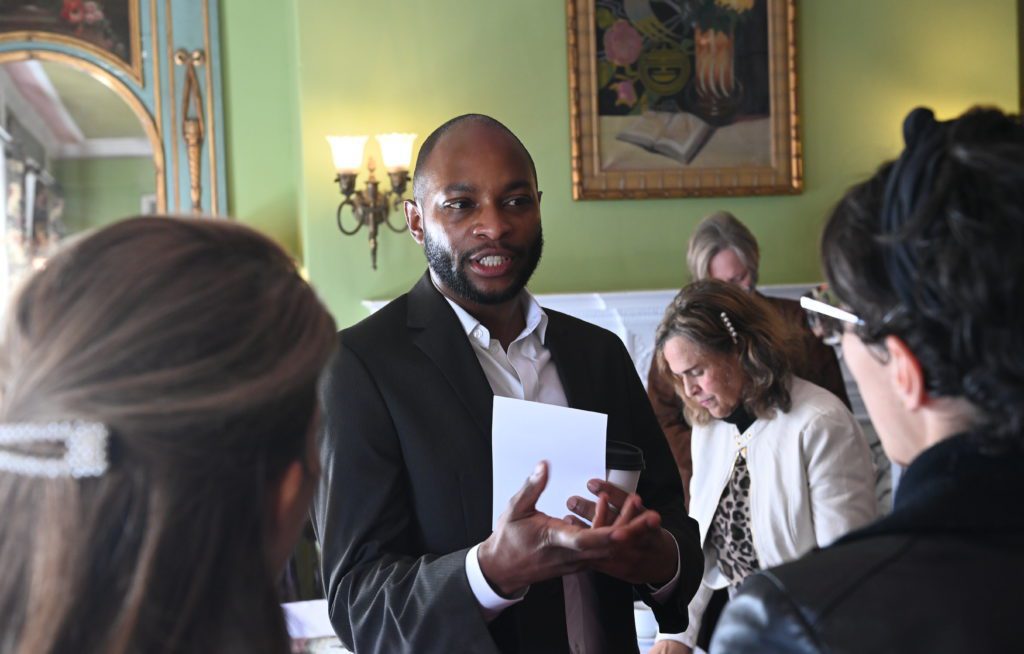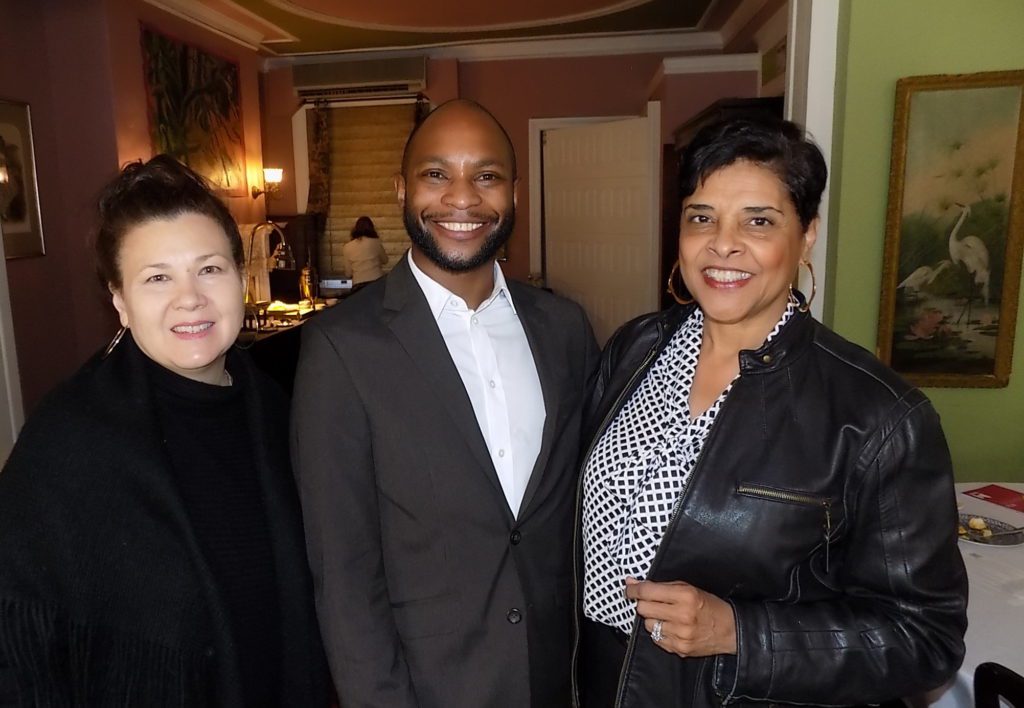Mosaic’s Douglas: ‘For Us, History Is Alive’
By • October 24, 2022 0 1298

When he was named Mosaic Theater Company’s artistic director last November, Reginald L. Douglas was in Pittsburgh at City Theatre, a former employer, directing a work he had helped hatch, “An Untitled New Play by Justin Timberlake” (not really by Timberlake). Then, as 2022 began, he was back at D.C.’s Studio Theatre — where he had been associate artistic director since early in 2020 — directing Suzan-Lori Parks’s “White Noise.”
A Georgetown University graduate, Douglas has now put down roots on H Street NE at the Atlas Performing Arts Center, Mosaic’s home since its 2014 founding by Ari Roth. His inaugural season having begun this month with Ifa Bayeza’s “The Till Trilogy,” it was clear at The Georgetowner’s Oct. 20 Cultural Leadership Breakfast that Douglas’s philosophy and ambitions perfectly coincide with those of his new company.
Mosaic’s name means you “take disparate parts,” he explained, “and make a more beautiful whole.” A key question: “How do we bring more people to the creative table?”
Postponed by the pandemic, Mosaic’s presentation of “The Till Trilogy” — about the life, murder and legacy of Emmett Till — was set for this fall, but Douglas had the opportunity to make changes: specifically, to recast the shows — with 10 actors, eight D.C. residents — and to run the three plays in repertory. Jaws dropped when he asked, “What if we open them all at once?”
Directed by Talvin Wilks, the plays, “The Ballad of Emmett Till,” “That Summer in Sumner” and “Benevolence,” a world premiere, will run through Nov. 20. The Rev. Wheeler Parker Jr., who witnessed his cousin’s abduction, other members of the Till family and the widow of Simeon Booker, the journalist who took the lead reporting Till’s story, have attended performances. “For us,” said Douglas, “history is alive.”
His signature innovation was to envision a “Reflection Series” of free events, organized with more than two dozen partners, including the Anacostia Community Museum, Arena Stage, the Folger Shakespeare Library, Ford’s Theatre, Howard University, Imagination Stage, Shakespeare Theatre Company, Signature Theatre and Washington National Opera.
In addition to virtual sessions, events were planned not only at the Atlas but at the Library of Congress, the Martin Luther King Jr. Memorial Library, the Hill Center and Eaton Hotel DC. “We wanted to get outside of our walls,” Douglas said.
The aim of the series is to engage D.C.-area residents with Till’s legacy in “this moment” of racial reckoning, according to Douglas. He described getting goosebumps at a recent intergenerational matinee, which brought high school students together with seniors who had lived through the civil rights era. At a discussion with members of a group of Black mothers who had lost children, one participant commented: “We are the modern-day Mamie Till-Mobleys.”
Though much of the series has passed, two upcoming events at the Atlas are: “The Push for the Emmett Till National Park” on Oct. 29 and, with ACLU DC, “Reflections on Justice in Our City” on Nov. 5.
Douglas will direct the second show of Mosaic’s season, “Bars and Measures” by Idris Goodwin, with a newly commissioned jazz score, to be presented in February. Running down the rest of the season — Mona Mansour’s “Unseen,” about an American woman photojournalist in Istanbul, in April and Donja R. Love’s “One in Two,” which touches on LGBTQ+ issues (as does “Unseen”), including HIV, in June — Douglas said that the “through-line” was looking at recent history “through a new lens.”
An executive committee member of the board of directors of the National New Play Network, he has long been devoted to the cause of new work. In December, Mosaic will host a workshop presentation of “Mexodus,” a hip hop-infused musical about enslaved people who went south to Mexico, followed in January by the Catalyst New Play Festival. Related initiatives include the Trish Vradenburg New Play Commission Program, supporting women playwrights; the Andrew W. Mellon Playwright-in-Residence, currently Psalmayene 24; and a high school playwriting contest.
After his remarks, Douglas responded to a question about the season’s serious tone with a question: “What does commercial mean in 2022?” He shared advice from mentor Emily Mann of Princeton’s McCarter Theatre Center: to make everything an event and not to present anything you wouldn’t want to go to. There are “ways to be commercial within your mission,” he stated.
The next Cultural Leadership Breakfast will take place on Thursday, Nov. 17, from 8 to 9:30 a.m. at the Tabard Inn, 1739 N St. NW. Dumbarton Oaks Executive Director Yota Batsaki will speak. Advance registration (required) is available HERE.

Long & Foster’s Theresa Nielson and Carla Labat flank Mosaic Theater Company’s Reginald Douglas at The Georgetowner’s Oct. 20 Cultural Leadership Breakfast. Photo by Robert Devaney.

